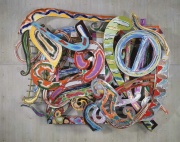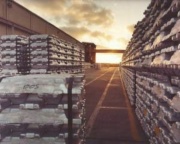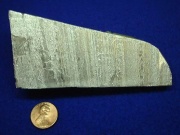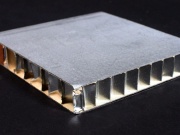Difference between revisions of "Aluminum"
m (Text replace - "\[http:\/\/cameo\.mfa\.org\/materials\/fullrecord\.asp\?name=([^\s]+)\s(.*)\]" to "$2") |
|||
| (3 intermediate revisions by the same user not shown) | |||
| Line 1: | Line 1: | ||
| − | [[File:2001.581-SC28631.jpg|thumb|]] | + | [[File:2001.581-SC28631.jpg|thumb|Pachanak<br>MFA# 2001.581]] |
| + | [[File:image 4-Alcoa.jpg|thumb|Aluminum ingots]] | ||
== Description == | == Description == | ||
A lightweight, silvery white metallic element. Aluminum, or aluminium (IUPAC), is the third most abundant element occurring in 8.3% of the earth's crust. Aluminum is found in clays (aluminosilicates), [[cryolite|cryolite]] (sodium aluminum fluoride), [[alum|alum]] (aluminum potassium sulfate), [[bauxite|bauxite]] (hydrated aluminum oxide) and [[aluminum%20oxide|aluminum oxide]] ([[ruby|ruby]], [[corundum|corundum]], and [[emery|emery]]). It does not naturally occur in the metallic state. Metallic aluminum was first isolated in 1825 by Hans Christian Ørsted in Denmark. By 1888, the Aluminum Company of America (ALCOA) was producing large amounts of the inexpensive metal. By 1920, aluminum was being used for aircraft, windows, doors, handrails and interior household items. Aluminum is a good electrical conductor and a good radiation reflector. The soft, nonmagnetic metal can be cast, extruded, rolled, and wrought into many shapes. Metallic aluminum accepts a high polish and forms a thin, transparent, corrosion-resistant oxide layer. It can also be anodized, or electrolytically oxidized, to create a harder, more resistant oxide film. After World War II, dyes or pigments were popularly used to color anodized aluminum. Baked on enamel coatings for aluminum siding were developed in the early 1950s. | A lightweight, silvery white metallic element. Aluminum, or aluminium (IUPAC), is the third most abundant element occurring in 8.3% of the earth's crust. Aluminum is found in clays (aluminosilicates), [[cryolite|cryolite]] (sodium aluminum fluoride), [[alum|alum]] (aluminum potassium sulfate), [[bauxite|bauxite]] (hydrated aluminum oxide) and [[aluminum%20oxide|aluminum oxide]] ([[ruby|ruby]], [[corundum|corundum]], and [[emery|emery]]). It does not naturally occur in the metallic state. Metallic aluminum was first isolated in 1825 by Hans Christian Ørsted in Denmark. By 1888, the Aluminum Company of America (ALCOA) was producing large amounts of the inexpensive metal. By 1920, aluminum was being used for aircraft, windows, doors, handrails and interior household items. Aluminum is a good electrical conductor and a good radiation reflector. The soft, nonmagnetic metal can be cast, extruded, rolled, and wrought into many shapes. Metallic aluminum accepts a high polish and forms a thin, transparent, corrosion-resistant oxide layer. It can also be anodized, or electrolytically oxidized, to create a harder, more resistant oxide film. After World War II, dyes or pigments were popularly used to color anodized aluminum. Baked on enamel coatings for aluminum siding were developed in the early 1950s. | ||
| − | |||
| − | |||
== Synonyms and Related Terms == | == Synonyms and Related Terms == | ||
| Line 10: | Line 9: | ||
Al; aluminum (U.S.); [[aluminium]] (IUPAC, Br., Dan., Deut., Fr., Ned., Nor., Sven.); alumen (Lat.); alkuaine (Fin.); alumiini (Fin.); alluminio (It.); alumínio (Port.); aluminio (Esp.); glin (Pol.); CI 77000; Arclad; ALCOA; alumel (aluminum-nickel alloy); | Al; aluminum (U.S.); [[aluminium]] (IUPAC, Br., Dan., Deut., Fr., Ned., Nor., Sven.); alumen (Lat.); alkuaine (Fin.); alumiini (Fin.); alluminio (It.); alumínio (Port.); aluminio (Esp.); glin (Pol.); CI 77000; Arclad; ALCOA; alumel (aluminum-nickel alloy); | ||
| − | == | + | [[File:AluminumMetalemr.jpg|thumb|Metallic aluminum]] |
| + | == Risks == | ||
| + | |||
| + | Overexposure can cause irritation of eyes, skin, and mucous membranes. | ||
| + | |||
| + | Powder and flakes form flammable and explosive mixtures in air. | ||
| + | |||
| + | Fisher Scientific: [https://www.fishersci.com/store/msds?partNumber=S25144&productDescription=ALUMINUM+METAL+FINE+PWD+100G&vendorId=VN00115888&countryCode=US&language=en SDS] | ||
| + | |||
| + | [[File:alumsupport1.jpg|thumb|Aluminum support panel]] | ||
| + | [[File:alum cleat.jpg|thumb|Aluminum cleat]] | ||
| + | == Physical and Chemical Properties == | ||
Reacts with dilute hydrochloric acid, hot concentrated sulfuric acid and hydroxides. | Reacts with dilute hydrochloric acid, hot concentrated sulfuric acid and hydroxides. | ||
| − | Metallic aluminum can be detected using [[Alizarin%20Red%20S|Alizarin Red S]]. Aluminum ions can | + | Metallic aluminum can be detected using [[Alizarin%20Red%20S|Alizarin Red S]]. Aluminum ions can be detected with [[aluminon|aluminon]]. |
Aluminum can corrode when wet and in contact with alkaline or metallic materials, such as concrete, plaster, wallboard, iron, or copper. | Aluminum can corrode when wet and in contact with alkaline or metallic materials, such as concrete, plaster, wallboard, iron, or copper. | ||
| Line 32: | Line 42: | ||
|- | |- | ||
! scope="row"| Melting Point | ! scope="row"| Melting Point | ||
| − | | 660 | + | | 660 C |
|- | |- | ||
! scope="row"| Density | ! scope="row"| Density | ||
| − | | 2.70 | + | | 2.70 g/ml |
|- | |- | ||
! scope="row"| Molecular Weight | ! scope="row"| Molecular Weight | ||
| Line 41: | Line 51: | ||
|- | |- | ||
! scope="row"| Boiling Point | ! scope="row"| Boiling Point | ||
| − | | 2327 | + | | 2327 C |
|} | |} | ||
| − | + | == Resources and Citations == | |
| − | == | ||
| − | |||
| − | |||
| − | |||
| − | |||
| − | |||
| − | |||
| − | |||
| − | |||
| − | |||
| − | |||
| − | |||
| − | |||
| − | |||
| − | |||
| − | |||
| − | |||
| − | + | * Stephen Kelley; "Aluminum", in ''Twentieth-Century Building Materials'', T. Jester (ed.), McGraw-Hill: New York, 1995. | |
| − | + | * O. Untracht, ''Metal Techniques for Craftsmen'', Doubleday and Co., Garden City, NY, 1968. | |
| − | |||
| − | |||
| − | |||
| + | * J.Waite, "Architectural Metals: Their Deterioration and Stabilization" in ''Preservation and Conservation: Principles and Practice'', S.Timmons (ed.), Preservation Press, Washington DC, 1976, p. 213. | ||
| − | + | * Web Elements: [http://www.webelements.com/webelements/elements/text/Al/key.html Website] | |
* ''Chemical & Engineering News'', American Chemical Society, Washington DC, 81 (36) , Sept. 8, 2003 | * ''Chemical & Engineering News'', American Chemical Society, Washington DC, 81 (36) , Sept. 8, 2003 | ||
| Line 83: | Line 74: | ||
* Michael McCann, ''Artist Beware'', Watson-Guptill Publications, New York City, 1979 | * Michael McCann, ''Artist Beware'', Watson-Guptill Publications, New York City, 1979 | ||
| − | * ''Encyclopedia Britannica'', http://www.britannica.com Comment: "Aluminum." | + | * ''Encyclopedia Britannica'', http://www.britannica.com Comment: "Aluminum." Accessed: 8 July 2004 . |
* Thomas C. Jester (ed.), ''Twentieth-Century Building Materials'', McGraw-Hill Companies, Washington DC, 1995 | * Thomas C. Jester (ed.), ''Twentieth-Century Building Materials'', McGraw-Hill Companies, Washington DC, 1995 | ||
| Line 95: | Line 86: | ||
* ''The Merck Index'', Martha Windholz (ed.), Merck Research Labs, Rahway NJ, 10th edition, 1983 Comment: entry 331 | * ''The Merck Index'', Martha Windholz (ed.), Merck Research Labs, Rahway NJ, 10th edition, 1983 Comment: entry 331 | ||
| − | * Wikipedia | + | * Wikipedia: http://en.wikipedia.org/wiki/Aluminum |
* ''The American Heritage Dictionary'' or ''Encarta'', via Microsoft Bookshelf 98, Microsoft Corp., 1998 | * ''The American Heritage Dictionary'' or ''Encarta'', via Microsoft Bookshelf 98, Microsoft Corp., 1998 | ||
| − | * Website | + | * Website: http://www.coloria.net/varita.htm - Finnish name, CI 77000 |
| − | * Website | + | * Website: alumel at www.answers.com |
[[Category:Materials database]] | [[Category:Materials database]] | ||
Revision as of 11:07, 26 April 2022
Description
A lightweight, silvery white metallic element. Aluminum, or aluminium (IUPAC), is the third most abundant element occurring in 8.3% of the earth's crust. Aluminum is found in clays (aluminosilicates), Cryolite (sodium aluminum fluoride), Alum (aluminum potassium sulfate), Bauxite (hydrated aluminum oxide) and Aluminum oxide (Ruby, Corundum, and Emery). It does not naturally occur in the metallic state. Metallic aluminum was first isolated in 1825 by Hans Christian Ørsted in Denmark. By 1888, the Aluminum Company of America (ALCOA) was producing large amounts of the inexpensive metal. By 1920, aluminum was being used for aircraft, windows, doors, handrails and interior household items. Aluminum is a good electrical conductor and a good radiation reflector. The soft, nonmagnetic metal can be cast, extruded, rolled, and wrought into many shapes. Metallic aluminum accepts a high polish and forms a thin, transparent, corrosion-resistant oxide layer. It can also be anodized, or electrolytically oxidized, to create a harder, more resistant oxide film. After World War II, dyes or pigments were popularly used to color anodized aluminum. Baked on enamel coatings for aluminum siding were developed in the early 1950s.
Synonyms and Related Terms
Al; aluminum (U.S.); Aluminium (IUPAC, Br., Dan., Deut., Fr., Ned., Nor., Sven.); alumen (Lat.); alkuaine (Fin.); alumiini (Fin.); alluminio (It.); alumínio (Port.); aluminio (Esp.); glin (Pol.); CI 77000; Arclad; ALCOA; alumel (aluminum-nickel alloy);
Risks
Overexposure can cause irritation of eyes, skin, and mucous membranes.
Powder and flakes form flammable and explosive mixtures in air.
Fisher Scientific: SDS
Physical and Chemical Properties
Reacts with dilute hydrochloric acid, hot concentrated sulfuric acid and hydroxides.
Metallic aluminum can be detected using Alizarin Red S. Aluminum ions can be detected with Aluminon.
Aluminum can corrode when wet and in contact with alkaline or metallic materials, such as concrete, plaster, wallboard, iron, or copper.
Crystal structure = cubic face centered
| Composition | Al (atomic no. 13) |
|---|---|
| CAS | 7429-90-5 |
| Mohs Hardness | 2.75 |
| Melting Point | 660 C |
| Density | 2.70 g/ml |
| Molecular Weight | atomic wt = 26.9815 |
| Boiling Point | 2327 C |
Resources and Citations
- Stephen Kelley; "Aluminum", in Twentieth-Century Building Materials, T. Jester (ed.), McGraw-Hill: New York, 1995.
- O. Untracht, Metal Techniques for Craftsmen, Doubleday and Co., Garden City, NY, 1968.
- J.Waite, "Architectural Metals: Their Deterioration and Stabilization" in Preservation and Conservation: Principles and Practice, S.Timmons (ed.), Preservation Press, Washington DC, 1976, p. 213.
- Web Elements: Website
- Chemical & Engineering News, American Chemical Society, Washington DC, 81 (36) , Sept. 8, 2003
- R. J. Gettens, G.L. Stout, Painting Materials, A Short Encyclopaedia, Dover Publications, New York, 1966
- Ralph Mayer, A Dictionary of Art Terms and Techniques, Harper and Row Publishers, New York, 1969 (also 1945 printing)
- Dictionary of Building Preservation, Ward Bucher, ed., John Wiley & Sons, Inc., New York City, 1996
- Michael McCann, Artist Beware, Watson-Guptill Publications, New York City, 1979
- Encyclopedia Britannica, http://www.britannica.com Comment: "Aluminum." Accessed: 8 July 2004 .
- Thomas C. Jester (ed.), Twentieth-Century Building Materials, McGraw-Hill Companies, Washington DC, 1995
- G.S.Brady, Materials Handbook, McGraw-Hill Book Co., New York, 1971
- Richard S. Lewis, Hawley's Condensed Chemical Dictionary, Van Nostrand Reinhold, New York, 10th ed., 1993
- Random House, Webster's Encyclopedic Unabridged Dictionary of the English Language, Grammercy Book, New York, 1997
- The Merck Index, Martha Windholz (ed.), Merck Research Labs, Rahway NJ, 10th edition, 1983 Comment: entry 331
- Wikipedia: http://en.wikipedia.org/wiki/Aluminum
- The American Heritage Dictionary or Encarta, via Microsoft Bookshelf 98, Microsoft Corp., 1998
- Website: http://www.coloria.net/varita.htm - Finnish name, CI 77000
- Website: alumel at www.answers.com




